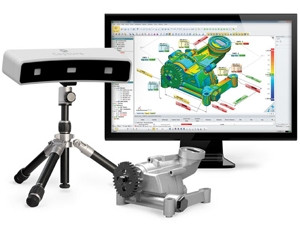
With companies like Rectron climbing on board the 3D printing train, the technology is going mainstream. Consumers are expected to drive demand, increasing the addressable size of the local market.
Rectron last week said it had partnered with MakerBot - which bills itself as a global leader in the technology - to distribute its products to the African market. Rectron will distribute all MakerBot products, including the newest generation of 3D printers: the Replicator Desktop 3D Printer, Replicator Mini Compact 3D Printer, and Replicator Z18 3D Printer, as well as its scanner.
Bruce Bradford, group business unit manager, printer category, with Rectron SA, says the "popularity and usefulness of 3D printing has been growing tremendously over the past several years. The possibilities that 3D printing offers the local education, engineering, architecture and healthcare industries are enormous."
The local distribution of 3D printers was previously characterised by small companies with a handful of staff. These firms have seen sales orders doubling year-on-year as the technology catches on, with some selling around 300 units a year.
Bradford says Rectron is the "first broad-based IT distributor to distribute 3D printers in SA" and it intends aiding its resellers to take the product mainstream.
He says interest is growing, although this will not always translate into sales. "We are moving from an era of mass production, to what I like to call 'mass customisation', where product is manufactured on demand and to the consumers' exact requirements. Control is shifting down the supply chain to the consumer. 3D printing is going to change the world as we know it, right before our eyes."
Catching on
Helen von Maltitz, a director at 3D Printing Systems, says the technology is expected to go mainstream, although this is taking a little longer in SA than other parts of the world. She says the challenge so far has been that people do not just walk up to a shelf and grab a 3D printer. She notes those who set up demonstration centres will make a go of it.
Gartner lists 3D printing among its top strategic trends for next year, saying it will reach a tipping point over the next three years, as the market for relatively low-cost devices continues to grow rapidly and industrial use expands significantly. However, it says mainstream adoption is between five and ten years away, although businesses are expected to buy into solutions offered by the technology within two to five years.
The channel's involvement in offering 3D printers, which Von Maltitz expects to intensify, will "grow the size of the cake". She explains distributors are now keen because they have suddenly noticed the technology exists, is not going away, and will get bigger, and they do not want to miss out.
AxizWorkgroup has not yet entered the 3D printing market but would examine stocking the product as demand increases, notes business unit manager Liza White. She adds, however, the technology "is definitely going mainstream" where it used to be exclusive to big printing houses.
Von Maltitz notes MakerBot has an entrenched name in 3D printing and is a recognisable brand. The company's products, in the US, retail from as little as $1 375 to around $6 499 - putting the entry-level products within some consumers' reach. It is not yet clear how much Rectron will sell them for.
Consumer push
Rapid 3D Printing member David Bullock says the channel's entry-level offerings and the related publicity will bolster hype among consumers. However, he notes, this could be problematic because it could create misunderstanding around the full use and sophistication of higher-end printers, as people may not understand that entry-level devices are not sophisticated enough for some applications.
Rapid 3D Printing has also extended its reach, launching a partnership with Kemtek last week to expand its presence and boost its size and reach, says Bullock. As part of the agreement, the companies will open a Johannesburg-based demonstration centre.
ICT industry veteran Adrian Schofield says Rectron has seen an opportunity because of the interest created around the technology, but it is too soon to say how fast the market will grow. He notes the channel has to get involved to provide a more accessible source for end-users.
Share